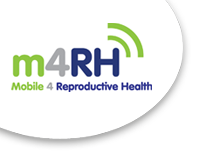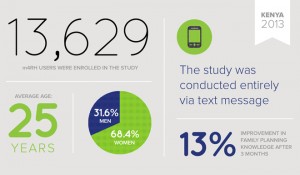Evidence
A randomized controlled trial conducted in Kenya in 2013 demonstrated a 13% improvement in family planning knowledge among m4RH users after three months, compared to a control group.
- Out of five questions, the m4RH group correctly answered 2.33 questions on average, compared to 2.06 in the control group.
- The intervention group showed a 13% improvement compared to the control group; this was a difference of 0.27 (0.055 standard error), statistically significant at p<.05.
- A total of 13,629 m4RH users were enrolled in the study. The average age of study participants was 25. About two-thirds (68.4%) were women and one-third (31.6%) were men.
- The study was conducted entirely via text message—reflecting innovation in the use of mobile phones not just for health programming but also for health research and evaluation.
- This study was conducted by Abt Associates, in partnership with FHI 360, with funding from USAID.
Results from 50 telephone interviews with m4RH users in Kenya and Tanzania in 2012, suggest that:
m4RH is Associated with Increased Family Planning Knowledge
Most participants reported that they learned new contraceptive information from m4RH. Participants also reported that they better understood the correct use of various contraceptive methods because of knowledge gained through m4RH. Participants stated that m4RH taught them about contraceptive side effects and even about dual protection.
“I learned about different methods of FP, the ones I did not know existed.” —Female, Age 22
“[I] did not know other FP methods like implants existed, I decided to continue using condoms because it has a dual protection against STI and pregnancy.” —Male, age 21
m4RH May Support Behavior Change
The most common behavior changes reported were use of condoms and changing family planning methods. Some participants reported attending a clinic as a result of information they received from m4RH, and a few referred to increased self-efficacy for visiting a clinic and adopting FP.
“I changed my method from condoms to oral pills.” —Female, Age 24
“m4RH gave me courage to go and choose a method at the clinic.” —Female, Age 31
m4RH May Also Support Contraceptive Continuation
Many users reported maintaining their current family planning method.
“I did not change my method, I just continued with injections.” —Female, Age 26
m4RH Supports Partner Communication
Male participants reported learning that family planning is an issue for men and about how to communicate with their partners about family planning.
“Family planning was perceived long term as an issue for women but now I understand it’s for all women and men.” —Male, Age 21
“I told my wife, and actually we read the messages together.” —Male, Age 34
m4RH Users Were Very Satisfied with the Program
They reported that the messages were easy to understand and informative.
“It is using terms you can understand. It has clear knowledge on what you want to know. It is simple to understand, simple language that everyone can understand.” —Female, Age 22
Young People Especially Liked the Convenience of m4RH
They noted that the program is fast, simple to use, confidential, and free.
“I like [m4RH] a lot! It is time saving—only you and your phone, and [it’s] confidential—only you and your phone!” —Male, Age 21
Respondents to a text message-based survey conducted in Kenya in 2015 reported a number of reasons for accessing m4RH. These are reported as verbatim responses to the question: “Why did you choose to use the m4RH system?”
To Learn About Specific Family Planning Methods
General Curiosity
Desire to Space Births
Desire to Delay Pregnancy and Protect the Future
To Improve General Contraceptive Knowledge
For more information about m4RH program monitoring, evaluation, and research results, see these peer-reviewed publications:
L’Engle, K., Vahdat, H., Ndakidemi E., Lasway C., & Zan, T. (2013) Evaluating feasibility, reach and potential impact of a text message family planning information service in Tanzania. Contraception, 87:251-256.
Vahdat, H., L’Engle K., Plourde K., Magaria L., & Olawu A. (2013). ‘There are some questions you may not ask in a clinic’: Providing contraception information to young people in Kenya using SMS. International Journal of Obstetrics and Gynecology Nov; 123 Suppl 1:e2-6. doi: 10.1016/j.ijgo.2013.07.009
Tools & Resources
-
m4RH Cost Considerations
This one-pager describes the cost considerations associated with developing a mobile phone program like m4RH.
https://m4rh.fhi360.org/wp-content/uploads/2015/03/Cost-Considerations.pdf
-
Partnering for Promotion of FP Information Delivered by Mobile Phone
This presentation provides an overview of the collaborative development and implementation approach used with m4RH in Kenya and Tanzania.
https://m4rh.fhi360.org/wp-content/uploads/2015/03/m4RH-Presentation_Partnering-for-Promotion.pdf

